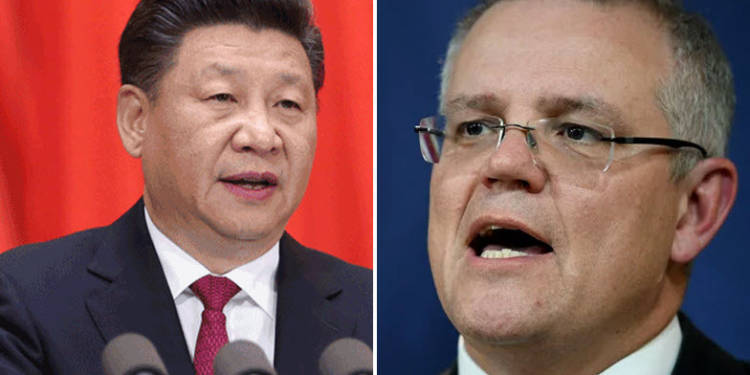As criticism mounts against Beijing for its murky role in handling the Coronavirus Pandemic, downplaying its severity and misleading the entire world, the latest country to join the anti-China bandwagon is Australia.
Palpable anti-China sentiment is taking root down under even as the Australia Foreign Minister Marise Payne has demanded an independent inquiry has pushed for a global, independent inquiry into the “origins” of COVID-19 and China’s handling of the initial outbreak in Wuhan, which ultimately led to a Pandemic that has infected millions across the world.
Marise Payne has also insisted Beijing to allow transparency in the process and has also made it clear that the World Health Organisation (WHO) shouldn’t run the inquiry. This doesn’t come as a surprise since WHO has been acting more like Beijing’s mouthpiece than an independent intergovernmental organisation.
The “origins” of the novel Coronavirus are being questioned the world over and recently the world has started giving serious consideration to the theory that the virus originated in the Wuhan Institute of Virology(WIV) — the largest virus bank in Asia which preserves more than 1,500 strains and is situated just 8 miles away from the Huanan wet market.
The fact that Australia’s Foreign Minister should call for an independent investigation into the “origins” of the Pandemic- which has also resonated with Prim Minister Scott Morrison, shows the kind of anti-China sentiment is taking roots in Australia.
This is a really bold move coming from Australia, given that China happens to be, by far, its biggest trading partner contributing as much as the US $ 194.6 billion worth of imports and exports to the Australian economy.
Moreover, there are significant Chinese investments in Australia, but now the latter is growing increasingly suspicious of aggressive Chinese investments. Recently, it even tightened investment rules on foreign takeovers at a time when India and the West too have taken measures preventing predatory behaviour from Beijing.
Meanwhile, the Australian Navy is also stepping up the heat on the People’s Liberation Army Navy in the South China Sea. As Beijing started pushing for its “historical maritime rights” aggressively during the COVID-19 outbreak, other stakeholders, including the United States have ganged up against Beijing.
Notwithstanding its deep economic ties with Beijing, an Australian frigate too joined hands with three United States warships in the strategic waterways near an area where a Chinese survey ship is suspected to be exploring for oil.
The Chinese research ship, the Haiyang Dizhi 8 was found conducting a survey close to an exploration vessel operated by Malaysia’s state oil company Petronas, last week.
Its “historical maritime rights” in the South China Sea and the “nine-dash line” strategy has been a very emotive issue for Beijing, so much so that the country has also defied the ICJ ruling on maritime rights in the South China Sea.
By ganging up with the US Navy in this region, Canberra might be directly poking the Dragon in the eyes.
Driving anti-China sentiment in Australia is the reports of Beijing robbing Australia of medical equipment immediately before the COVID-19 outbreak hit Pandemic levels.
According to a report in Dailymail—China in total imported more than two billion masks and 25 million pieces of protective clothing from overseas between January 24 and February 29 before the Wuhan virus outbreak reached pandemic levels.
Risland Australia, one of the Chinese-owned property developers reportedly shipped 80 tons of medical supplies to China in late February. The supplies included 100,000 protective coveralls and 900,000 pairs of medical gloves.
A former Chinese military officer, Kuang Yuanping, now based in Sydney, was found to have coordinated with CCP agencies to export tonnes of Australian medical supplies to Wuhan in February.
Australia was thus drained of medical supplies by Beijing immediately before the Pandemic started hitting other parts of the world outside China, including Australia.
Australia had already banned Huawei way back in 2018 citing technical concerns and also political concerns about proximity between the telecom major and the Communist Party of China (CCP).
In fact, Chinese investments in Australia have always been a matter of concern, given the weak campaign finance laws in Australia that allow Chinese billionaires having deep connections with the Communist regime in Beijing like Huang Xiangmo to finance Australian politicians and buying influence down under.
In fact, the Australian Security Intelligence Organisation (ASIO) too had warned political parties that taking cash from the Chinese billionaires who could be acting as a conduit for the CCP could compromise Australia.
Beijing had significant investments as well as influence down under, but the Coronavirus Pandemic and allegations of a cover-up, apart from suspicions of the virus originating in the Wuhan Institute of Virology have changed things drastically.
Australia is turning increasingly hostile towards Beijing, and Beijing has only itself to blame for losing another major trading partner where it enjoyed significant investments and influence.





























